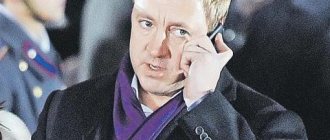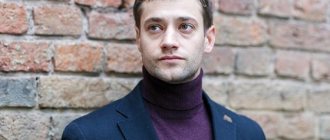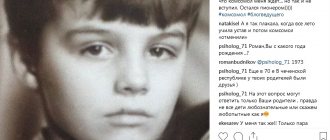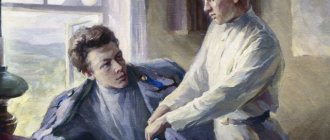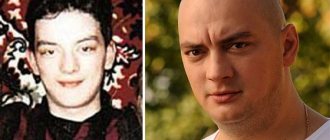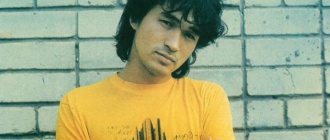Childhood and early years
Popular Russian TV presenter Roman Babayan, biography, family, whose parents were hidden from the eyes of journalists for a long period of time, was born in the capital of Azerbaijan, Baku, back in 1967. He remembers his hometown as the most beautiful and unique in the entire territory of the former Soviet Union, and very much regrets that he had to leave it. What attracted him most about his native Baku was the internationality and open-mindedness of its inhabitants, for whom the origin of the interlocutor was not a determining factor. In terms of loyalty to national minorities, this city can only be compared to Odessa. To this day, he maintains warm friendly relations with his childhood friends and classmates with whom he studied at school 82.
Present tense. From correspondent to the most sought-after presenter.
When the TVC channel offered Roman airtime, he didn’t think twice about it. He already, as always, had something to offer his viewer. Very soon, viewers and fans of Babayan’s work saw a new format of the show, which amazed everyone: from the ordinary TV viewer to high-ranking officials.
Babayan’s new “brainchild” was called “ Right to Vote”
" It was this show that generated both interest and a huge amount of negative feedback from those who liked to be in the dark. The forum and the official public pages of the TV show were inundated with angry messages from anti-fans that this show was polluting the brains of young people, did not teach anything good and only taught them the skill of shouting down their interlocutor. According to these same “fans,” a worse TV show cannot be found on television.
However, there were thousands of times more positive reviews. “The right to vote” was of interest not only to those who had crossed the threshold of middle age. The TV show was and is watched by both teenagers and pensioners. Currently, the TV show “Right to Vote” is named the highest rated program on the TVC channel. After the first episode of the show aired, it was clear that the format would become popular, and the topics would not lose their relevance. Every day, Babayan raised current topics and invited experts to help understand not from the point of view of the layman, but from the point of view of a specialist. After some time, specialists from various fields themselves wanted to get on the program, and the editors of the project stopped looking for the right specialists themselves. This speaks of the impeccable popularity of the show, its necessity and the fact that Babayan “hit the mark” by inventing and launching this project on the TV channel.
Military service and moving to Moscow
After receiving secondary education, he entered the first year of the Polytechnic Institute in Baku, where he studied for only two years, majoring in radio engineering.
He had to leave his studies and the sunny sea coast to be drafted into the army: since 1986, Roman was in the ranks of the Southern Soviet troops, which were localized in Hungary. Unfortunately, Roman never managed to return to his native Baku, although he constantly dreams about it: once he almost succeeded, but the flight had to be canceled due to high risks, because no one guaranteed him safety in his native lands due to the Armenian Azerbaijani conflict and a clear position in the media.
View gallery
After two years in the army, Roman moved to Moscow, where he resumed his studies, only this time at the Institute of Television and Radio Broadcasting. Three years later, he graduated from the institute, from which he emerged as a certified specialist with perfect command of English and Turkish.
Parents and family connections of Roman Babayan
Many viewers of the “Right to Voice” show were interested in everything about such a presenter as Roman Babayan: biography, family, parents. Roxana Babayan was his distant relative, which was a real discovery for the presenter’s fans.
View gallery
Roman was born into an international family - his mother is a native of Baku with Russian roots, and her ancestors come from Karabakh and Getashen. They moved to the capital of Azerbaijan after the revolution. Roman received his name in honor of his maternal grandfather, who was a soloist at the Mariinsky Theater in St. Petersburg. He was then sent to give concerts throughout the former territory of the Soviet Union: he spent a long period of time traveling until he settled in Baku, founding an opera and ballet theater there, where he was a leading soloist, and then began teaching vocals at the local conservatory.
View gallery
Much less is known about his father’s line: only that almost all relatives on his side are from Kirovobad, where Babayan still comes to visit friends and family to this day.
Television career
Immediately after graduating from the institute, Babayan began his career in his specialty: he went to work as an engineer at the Radio Russia radio station. He calls his career in television an accident: at one time he planned to become a radio technician in his hometown. But, once he saw a rally with the slogans “Death to the Armenians” on the streets of Baku, he decided to move to Moscow, where he was daily confronted with the activities of correspondents and presenters, in whose work he was attracted by their impartiality and the opportunity to cover different points of view. One day, plucking up courage, he decided to turn to one of the leading editors of his native institute with a request to give him a job. Due to the fact that it was time for holidays and holidays, there were practically no journalists and editors on site, so Roman easily got his first job. Diligence and hard work bore fruit: after just six months, the aspiring journalist had his own TV show, “Neighbors,” which aired once a week. Then his career began to develop rapidly: first he became a correspondent for Vesti, then began working in the news program Vremya, which aired on the ORT channel.
View gallery
After working on various news and political projects on Russian television channels, he finally came up with his own television show, “The Right to Voice,” which made him famous throughout the CIS. The high rating and stable views of this program ensured its uniqueness: when Babayan began his activities, there were no similar projects in this field. Every evening, influential politicians and journalists appeared in the talk show audience, boldly expressing their opinions. Over time, Roman’s authority began to work for him, and high-ranking officials themselves began to ask to come to his studio.
Roman Babayan: I spent three hours giving advice to Putin on how to behave with Bush
The icon of St. Nicholas the Wonderworker more than once saved the host of the talk show “Right to vote” from certain death
The icon of St. Nicholas the Wonderworker more than once saved the host of the talk show “Right to vote” from certain death
In one of the recent episodes of Vladimir SOLOVIEV’s “Sunday Evening” program, the political debate between the Russophobe director Joseph RAIKHELGAUS and the patriotic political scientist Dmitry KULIKOV almost turned into hand-to-hand combat. For viewers of the talk show “Right to Voice,” hosted by 48-year-old Roman BABAYAN, a high degree of discussion is a common thing. And the point here is not that the participants in the debate are sometimes ready to grab each other by the throat. It was in Babayan’s studio that such interesting personalities first appeared that Roman’s colleagues soon “plundered” them into their programs. However, the tireless journalist finds more and more bright interlocutors and invites them to argue on such non-trivial topics that the ratings of “Right to Voice” are close to the indicators of Solovyov’s programs. Although the audience of the Rossiya-1 channel is much higher than that of the TVC, where Babayan rules the roost.
— Roman, at one time you worked as a war correspondent.
They must have gotten into dangerous scrapes. - It happened. Filmed reports under bombing in Belgrade in 1999. I visited the Tajik civil war, Chechnya, Baghdad... I remember, during a business trip to Israel, every morning I went with the cameraman to have breakfast at a pizzeria. And then one day we didn’t reach it, about 50 meters, when before our eyes it flew up into the air along with the visitors. We ran to the hotel, grabbed the camera and ended up at the scene of the explosion before the police. We filmed this whole nightmare, but decided not to stop there. When a suicide bomber carries out his bloody attack, the Israeli army carries out a retaliation operation in his hometown that evening. They found out that this time the militant came from a village bordering Egypt. And we decided to go there. We went through the checkpoint into Palestinian territory and picked up a taxi driver. We drove a little, and they stopped us at an Arab checkpoint. We show passports, accreditation cards of journalists, where all the information is in Hebrew. The people with the machine guns clearly don’t like something, and they take us to the Gaza Strip police station. They brought us to the boss’s office and kept us there for four hours, trying to figure out who we were and why we had come. The longer the wait, the more worried I become: I have to film the report at any cost and send it to Moscow for the evening newscast.
— Did you make it?
— The tension was growing. My excitement was conveyed to the people in uniform, and they started shouting at me, saying, sit silently and wait. Suddenly a man comes in and starts talking in Arabic to the colonel, the owner of the office. I understand that this is about us. And suddenly this guest turns and in perfect Russian tells me that he is the head of the special service responsible for the security of the Gaza Strip. They say he studied in the USSR and knows perfectly well what the “Time” program is, for which we are filming a story. We were immediately given tea and released. At parting, the serviceman advised us not to go anywhere. They say that the Israeli army, conducting a retaliation operation, indiscriminately shoots at everything that moves.
- But, of course, that didn’t stop you?
- Of course. We got into our taxi, drove 100 meters from the police headquarters, when suddenly it exploded! It turned out that an Israeli helicopter crossed the border and destroyed it with a missile strike. We jumped out of the car with a camera and began filming this horror: the flames were raging, corpses were lying around. I turn around, and our new acquaintance is standing next to me, who, it turns out, saved our lives... The next day in Jerusalem, colleagues from other channels patted me on the shoulder: “Don’t you think that with each such case, the margin of luck becomes smaller?” Yes, in one day I almost died twice. But I was sure that everything would be fine with us: on all business trips I take with me the icon of St. Nicholas the Wonderworker.
| In 2003, Roman interviewed the former Secretary General of the Communist Party of Chile, Luis CORVALAN. Photo: Ok.ru |
13 points of view
— How did it happen that you ended up on TV?
- Matter of chance. If they told me in my youth that I would be a TV journalist, I wouldn’t believe it. After school in his native Baku, he entered the Polytechnic Institute. Two years later I was drafted into the army, and when I returned and re-entered the university, the Karabakh conflict began. I remember how our head girl ran into the classroom with the words: “There will be no classes, we’re all going to the rally.” We stood on the square, and a column appeared from the direction of the university, heading towards the city center with the slogans: “Death to the Armenians.” I then realized that I, a person with an Armenian surname, was definitely not on the same path with these people. He went to Moscow, where he graduated from the Institute of Communications in 1991. He got a job as an engineer in the technical directorate of Radio Russia.
I watched with interest how the correspondents and presenters worked. And suddenly I realized that I was very attracted to this. For a long time I could not muster up the courage, but one day I finally came to the chief editor of the information service, Alexei Abakumov . He was surprised, but gave me the opportunity to prove myself. Moreover, it was summer and many reporters went on vacation. Six months later I already had my own weekly program “Neighbors”. Having returned from another business trip, I learned that I was being hired as a correspondent for the Vesti television program. Later he became a political observer on the “second button”, and then moved to Channel One (then it was still called ORT) in the “Time” program.
| With sons in Munich (2013). Photo: Ok.ru |
— How did you become a presenter on TVC?
— I was invited to be the editor-in-chief of the final program “Conclusions” by Peter Tolstoy. But one day the management of the “first button” decided that it would be nice if this program began to air on their behalf. They called it “Sunday Time” and invited all my correspondents and administrators there. I started making another program - “The Main Topic. Results" with Andrey Dobrov . Well, then “The Right to Vote” appeared, which has now become one of the highest-rated political talk shows. When we started it seven years ago, there was not a single program like ours on TV. Moreover, we decided to go on air daily. Imagine: every evening you need to find eight guests and four experts, and from the first “echelon”. We did this, and three months later there was a queue of high-ranking officials who wanted to participate in the project.
- You often have Ukrainian Nazis on your program - Karasev, Kovtun, Yakhno, Voronina. Who pays for their travel from Kyiv to Moscow and travel expenses?
- I don’t know, but definitely not us. We have no financial relations with them. And it would be strange to pay fees to people who throw mud at Russia... This quartet - Karasev , Kovtun , Yakhno and Voronina - was discovered by my editors at one time. And now such a system has developed: they come to Moscow and go on all kinds of political talk shows on different channels. Their mood changes, and I feel it. We communicate with them both before and after the broadcast. But, of course, these people will not say anything else in front of the cameras, they need to return home. It seems to me that mostly those who come to us are Ukrainian political scientists who work in various foundations and institutions that exist on foreign grants. And those who are financed by purely Ukrainian structures categorically refuse to visit Moscow.
— Many people believe that your program is the most poignant on TV.
“It’s not for me to judge, but for the TV viewers.” Certain events happen, we discuss them. My task is to inform any person who watches us, and let people draw their own conclusions. Viewers listen to at least 12 points of view, and including mine - 13. In all my time working on TV, I have never received any instructions from management on what to say and how. And when I started running the program, I began to adhere to the principle: you need to operate only with facts! Of course, sometimes emotions overwhelm me, but I try to control them. The point of any dispute is to find something constructive.
| With his wife Marina. Photo: Ok.ru |
Meetings and separations
— Do you know the powers that be?
- Yes, with many. For example, I had the opportunity to meet with Vladimir Putin I had very interesting feelings from communicating with him. After five minutes of conversation with the president, you begin to feel as if you have known him for many years. We met in Belgrade in 2000. Vladimir Vladimirovich then went to the first meeting with the new US President George W. Bush , which was scheduled in the Slovenian capital Ljubljana. But first, Putin flew to Belgrade to talk with Slobodan Milosevic . And I just arrived there from Kosovo, where I spent a month filming reports.
I arrive at the hotel and am about to take a shower, when suddenly they say from the editorial office: “President’s press secretary Alexei Gromov .” From him I learned that in 15 minutes a car would come for me and I would go to President Putin at Milosevic’s palace. As soon as Vladimir Vladimirovich appeared, they began to talk. He and Foreign Minister Ivanov , and Gromov and I on the other. Putin asked in detail what was happening in Kosovo. I spent three hours talking about how Orthodox churches were being blown up and what they were doing to the Serbs. After this, Vladimir Vladimirovich decided to fly to Pristina. And instead of returning to Moscow, as planned, I went with him to report.
- What happened then?
— After the negotiations, Putin returned to Belgrade, and I stayed because I urgently needed to send material to Moscow. And I didn’t even have my passport with me. We had to cross the Kosovo-Macedonian border at night. The Macedonian driver met us with the operator, put us in the car and transported us without documents. Then in Belgrade I talked again with Vladimir Vladimirovich. It turned out that when he began to explain everything in detail to his American colleague, Bush was very surprised how he knew all this. I asked Putin what impression the American made on him. “On some issues, he is simply not in the know!” - the president answered.
— When you were filming in hot spots, of course, your family in Moscow was worried about you...
— We met my wife Marina Chernova 25 years ago at work. We came to VGTRK together at the same time. They got married in 1995. Marina got into radio after attending theater and technical school. She was a sound engineer on my shift. Then she became a sound engineer. Then she worked at REN TV as a television director. We have three sons. After the birth of the youngest, the wife has not yet returned to duty. But I think he will go back to work soon. He really wants to work on the “Culture” channel.
— Are your sons going to follow in your footsteps?
- I do not know yet. The eldest - Georgiy, I named him in honor of my father - will soon turn 21 years old. He studies at the Academy of National Economy at the Faculty of International Regional Studies. The middle one, Herman, is 15 and a schoolboy. Well, the youngest, Robert, is four years old. When the elders were growing up, I was practically not at home. Lived on airplanes. Two days in Moscow, and then several weeks in a row - business trips. But the boys have my example. I often talk with them about their attitude towards the Motherland, about the history of the country.
— Your parents didn’t argue that your wife was Russian?
- So my mother is Russian, and my father is Armenian. It was when they themselves got married that there really were problems.
— They say you are still not allowed into your native Baku.
- Unfortunately, they are not allowed. I tried to enter there several times with Vladimir Shumeiko , Pavel Grachev , Lyudmila Putina . Did not work out. Even at the stage of preparing documents, the Azerbaijani embassy always sent a letter to the editor saying that they did not guarantee my safety. Once I returned from a business trip from Afghanistan to Moscow. The plane was landed for refueling in Azerbaijan. If they had told me about this in advance, I would have thought about whether to get into it. And, most likely, I would not risk it. And then it happened. I walked out onto the ramp, looked towards the city, breathed in the familiar air, saturated with the smell of oil, wormwood and sea, and with an aching heart returned to my chair.
Personal life
Roman Babayan is married to a Russian; we can say that he repeated the fate of his parents. If at that time the marriage of an Armenian and a Russian caused outrage and conflicts, then the presenter had no problems with it. He married Marina Chernova in 1994, with whom they had worked at the radio station since 1991. A busy work schedule and constant travel did not stand in the way of family happiness, and now the couple is raising three children: twenty-year-old son George, fifteen-year-old German and four-year-old Robert.
View gallery
The eldest son is currently studying at the Academy of National Economy and has no intention of following in his father’s footsteps. The presenter honestly admitted that he rarely took part in raising his sons: the reason for this was frequent departures. Previously, he worked on a schedule: several weeks on a business trip and a week at home. Roman Babayan, biography, family, parents, for whom children are the main value in life, has recently devoted more time to his sons and wife, to whom he is grateful for their patience, understanding and support in all life’s difficulties and in moving up the career ladder.
Journalism and television
Roman Babayan worked at VGTRK for 2 years. But ever since I was a student, I dreamed of being a correspondent, one who searches for and finds the hottest news. He decided to change his cozy office to work as a journalist. Since 1993, he began working as a correspondent for the Vesti program.
Roman Babayan in his youth
Often, Roman Georgievich reported from hot spots, although the journalist himself does not like this combination, just as when he is called a war correspondent. The man says that he has always been interested in crisis journalism. First he covered the events of the civil war in Tajikistan, then in Chechnya. After Chechnya, he went to Afghanistan.
Since 1997 he has been in Yugoslavia. When NATO announced the start of hostilities in 1999, the Yugoslavs decided to close their borders to entry. He and his cameraman Boris Agapkin remained at that time almost the only film crew from Russia in the country. They tried to transmit materials to Russia daily through the local television center.
TV presenter Roman Babayan
Roman conducted one of his reports directly during the bombing in Belgrade. In 2000, he was awarded the NATO medal “For participation in the NATO peacekeeping operation in Kosovo.” Although Roman himself said in an interview that he was a true opponent of this so-called peacekeeping operation. In 2000, Roman Babayan was invited to Channel One. He became a political observer for the Vremya program.
In 2003, I went on a business trip to Iraq. The first missile strike on Iraq found Roman's film crew in Baghdad. As a result, he managed to leave the country only after the United States entered the capital. Then his film “Iraq” was released. One hundred days without Saddam." Babayan was recognized as a laureate of the Press-ELITE award.
Roman Babayan
His film “Santiago” was no less successful. Chile. 30 years later,” telling about the events in Chile in 1973. Roman managed to interview the former Secretary General of the Communist Party of Chile, Luis Corvalan. By the way, Roman Babayan was the only journalist who managed to meet with Pinochet.
From 2005 to 2012 he worked at Channel Three. He was the chief editor of the “Main Topic” and “Conclusions” programs. In 2008, he became a TV presenter of the information program “City”.
In 2010, the TVC channel offered Roman airtime. At that time, he already had something to offer the public. Soon viewers saw a new format of the show. Every evening, popular journalists and influential politicians appeared on the “Right to Voice” program, they discussed current topics, expressed their opinions on this or that situation. Soon the editors even stopped looking for “guests” on the show themselves; specialists from various fields themselves wanted to get on the program.
Roman Babayan in the “Right to Voice” program
More than once, conflicts broke out between show participants in the studio. But in 2020, Roman himself could not stand it. In response to an unflattering phrase about Russians by Polish journalist Tomasz Maciejczuk, he threw his folder of papers at him and asked him to leave the studio.
And although Babayan immediately stepped aside, the conflict continued. All the guests of the TV show took part in it. The altercation continued until Ukrainian MP Igor Markov hit Matseychuk in the face. Filming on "The Right to Vote" was stopped. This program was not aired on the channel.
In 2020, Roman Babayan won the TEFI award in the category “Host of a prime-time socio-political talk show.”
